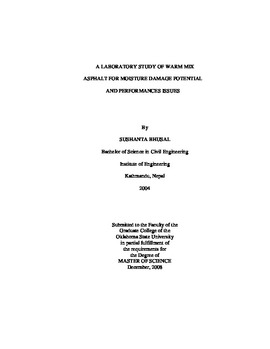| dc.contributor.advisor | Cross, Stephen Allan | |
| dc.contributor.author | Bhusal, Sushanta | |
| dc.date.accessioned | 2014-04-17T19:55:47Z | |
| dc.date.available | 2014-04-17T19:55:47Z | |
| dc.date.issued | 2008-12-01 | |
| dc.identifier.uri | https://hdl.handle.net/11244/10109 | |
| dc.description.abstract | A laboratory study was performed to: (a) evaluate the moisture damage potential of WMA (warm mix asphalt); (b) evaluate the dynamic modulus of WMA; and (c) evaluate the effect of mix temperature on densification of WMA. Two WMA additives, Aspha-min and Sasobit, and an anti-stripping agent were used for the study. A PG 64-22 asphalt binder and granite aggregate were used to make the WMA and control mixes. The test results were analyzed and the performance of WMA was evaluated and compared to conventional HMA. The moisture sensitivity test results showed that both the WMA and Control mixes showed had low TSR values. However, the addition of 0.5% liquid anti-stripping agent by mass of asphalt cement increased the moisture sensitivity performance by increasing the TSR value of WMA and Control. Hamburg wheel rutting test results showed that the WMA mixes had better resistance to moisture induced rutting than the Control mix. The WMA mixes required a higher number of cycles to reach the stripping inflection point and " rut depth. The addition of 0.5% liquid anti-stripping agent by mass of asphalt cement improved the performance but not as significantly as in the TSR test. The dynamic modulus E* test results showed that WMA additives significantly increased the stiffness of the mixes at higher test temperatures. The test results showed that the addition of 0.5% liquid anti-stripping agent by mass of asphalt cement did not significantly affect the stiffness of mixes expect at 21.1˚C. The densification test results using SGC (Superpave gyratory compactor) and AVC (Asphalt vibratory compactor) showed that WMA additives improved the compactibility of the mixes. The AVC test results showed that WMA reduced the compaction temperature by 70˚F. However, for the WMA mixes compacted over a range of temperatures, both SGC and AVC test results showed no significant difference in compactibility. | |
| dc.format | application/pdf | |
| dc.language | en_US | |
| dc.publisher | Oklahoma State University | |
| dc.rights | Copyright is held by the author who has granted the Oklahoma State University Library the non-exclusive right to share this material in its institutional repository. Contact Digital Library Services at lib-dls@okstate.edu or 405-744-9161 for the permission policy on the use, reproduction or distribution of this material. | |
| dc.title | Laboratory Study of Warm Mix Asphalt for Moisture Damage Potetential and Performances Issues | |
| dc.type | text | |
| dc.contributor.committeeMember | McTernan, William | |
| dc.contributor.committeeMember | Bulut, Rifat | |
| dc.contributor.committeeMember | Jeong, Hyung Seok | |
| osu.filename | Bhusal_okstate_0664M_10100.pdf | |
| osu.college | Engineering, Architecture, and Technology | |
| osu.accesstype | Open Access | |
| dc.description.department | School of Civil & Environmental Engineering | |
| dc.type.genre | Thesis | |
